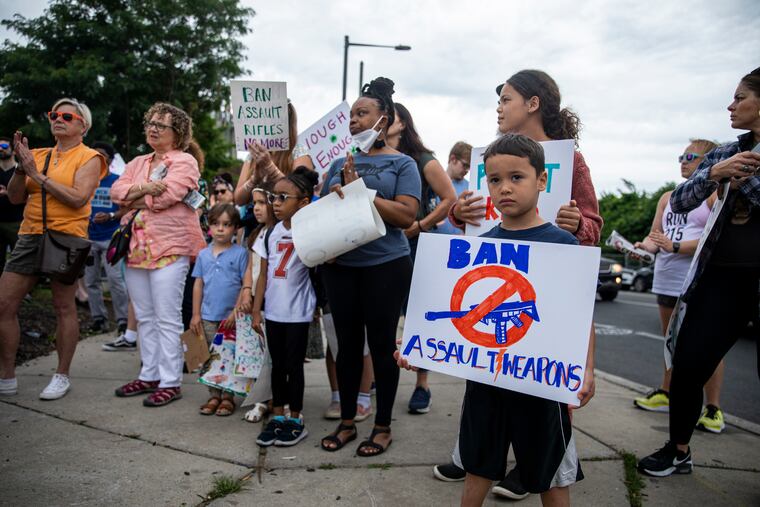Do mental health provisions belong in the Senate’s bipartisan gun safety deal?
Experts say the relationship between gun violence and mental health is limited and depends on the type of violence.

Mental health is a major focus of a bipartisan Senate gun deal billed as a political breakthrough in response to mass shootings, but experts are wary of linking gun violence too closely to psychiatric issues.
In addition to the first significant gun reforms in years, lawmakers propose to give states incentives to enact “extreme risk protection orders” — or so-called red flag laws. These allow authorities to remove firearms from the hands of people considered a threat to themselves or others, often due to a mental health crisis. Red flag laws have been applauded by researchers and advocacy groups as an important suicide prevention tool.
Other mental health provisions in the framework outlined by a group of U.S. senators are not related to gun access — and speak to what experts call a complicated and limited relationship between mental illness and shootings.
The Senate agreement calls for mental health measures such as investments in telehealth, funding for school-based mental health services, and an expansion of community behavioral health clinics with an emphasis on services to families and children. Legislation has not yet been released, so many details remain unknown.
» READ MORE: Senate negotiators announce a deal on guns, breaking logjam
Both mental health and gun-control advocacy groups traditionally have pushed back at making a sweeping connection between mental illness and tragic shootings. They note that people who are mentally ill are not necessarily uniquely violent.
Josh Fleitman, who manages initiatives in Western Pennsylvania for the gun violence prevention advocacy group CeasefirePA, applauded the Senate framework for bypassing his usual concerns about mental health being used to avoid issues of gun access and safety.
“As long as we are remaining focused on this fundamental issue of access to firearms, certainly mental health is a very important issue to work on,” he says.
Different types of violence, different connections to mental health
Different types of violence — such as mass shootings, firearm suicides, and the gun violence that affects Philadelphia daily — each involve unique mental health considerations, experts say.
People with mental illness generally are much more likely to be victims than perpetrators of violence, said David Mandell, director of the Center for Mental Health at the University of Pennsylvania.
“We have a mental health crisis, just like we have a gun violence crisis in this country — and there may be some overlap between them, but they are two separate crises,” Mandell said.
He noted that the nation should “not expect that by addressing the mental health crisis in the United States we will address the issue of gun violence.”
Even when there is overlap, Mandell says, the relationship and solutions depend on the context and type of violence. For example, in 2020, there were 24,245 firearm suicides in the United States, according to the CDC — accounting for about 5,000 more deaths than firearm homicides. Efforts to work with schools to address the risk of an on-campus shooting are unlikely to have an impact on the demographic at the highest risk of suicide — older white men.
Rep. Susan Wild is sensitive to the stigmatization of people with mental illness. Her partner died by suicide, an experience that she spoke about on the floor in Congress and has informed her legislative focus. The majority of people who are mentally ill don’t engage in violence, she acknowledges, but there have been reports of shooters who previously exhibited concerning behaviors. Wild hopes that more mental health services could get people help before a violent outburst.
Wild, a Democrat, applauds the mental health provisions of the Senate’s deal. “It’s important to recognize that we are in a mental health crisis in this country,” she said.
» READ MORE: Pa. congresswoman: After my partner died of suicide, mental health issues became my focus | Opinion
Research by the Violence Project, a nonprofit that maintains a database of mass shooters, has found that the majority of perpetrators exhibited some signs of crisis — most commonly increased agitation — prior to the shooting, but psychosis played no role in about 70% of incidents and played a major role in only 10%.
When it comes to mental health services to tackle the type of violence that plagues Philadelphia daily, there needs to be a focus on the lasting impact of trauma, according to Dorothy Johnson-Speight, founder and national executive director of the Philadelphia-based gun violence prevention group Mothers in Charge. Perpetrators of gun violence in Philadelphia, in most cases, don’t suffer from a severe mental illness but commonly have experienced unaddressed trauma, she said.
“Often times, what we see in the streets of Philadelphia, the antisocial behaviors that we see, are from folks who have also been victims,” she said.